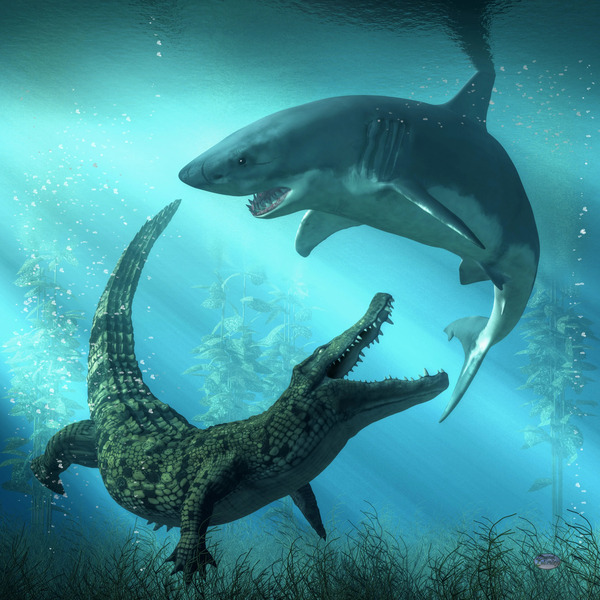Table of Contents:
Diet and Hunting Tactics: What Do They Eat and How Do They Hunt?
Real-Life Encounters: Can Sharks and Crocodiles Actually Fight?
When it comes to powerful predators, the shark and the crocodile are two animals that immediately come to mind. Both are apex predators in their respective environments and have an impressive set of survival traits. But what if these two fierce creatures were to meet in a battle? Who would come out on top? Let's dive into the key differences between sharks and crocodiles to understand which animal might win in a head-to-head showdown.

The size of an animal plays a major role in determining its fighting power. Let’s break down the size differences between sharks and crocodiles.
| Feature | Shark | Crocodile |
|---|---|---|
| Average Length | 8-12 feet (2.5 - 3.6 meters) | 13-23 feet (4 - 7 meters) |
| Largest Species | Great White Shark (20 feet / 6 meters) | Saltwater Crocodile (23 feet / 7 meters) |
| Weight | Up to 1.5 tons (1500 kg) | Up to 2,000 lbs (900 kg) |
Conclusion: Crocodiles generally outweigh and outsize most shark species, especially the larger saltwater crocodile.
Both sharks and crocodiles are known for their incredibly powerful bites. But which one has the upper hand?
| Feature | Shark | Crocodile |
|---|---|---|
| Bite Force | 1.8 tons (1,800 kg) – Great White | 3,700 pounds (1,700 kg) – Saltwater Crocodile |
| Teeth | Sharp, serrated teeth designed to tear through flesh | Conical teeth perfect for gripping and holding prey |
| Bite Duration | Quick strikes, fast bites | Slow, powerful crushing bites |
Conclusion: Crocodiles have a much stronger bite force, and their ability to hold onto and crush prey gives them a clear advantage in terms of raw strength.
Speed is another crucial factor in a fight. Whether it's the swift movement of a shark or the surprising speed of a crocodile, let's look at who has the edge.
| Feature | Shark | Crocodile |
|---|---|---|
| Swimming Speed | 25-35 mph (40-56 km/h) | 18 mph (29 km/h) (Short bursts) |
| Land Speed | Not applicable (Aquatic) | 11 mph (17.7 km/h) (Short bursts) |
| Agility | Very agile in water | Extremely agile in water and land |
Conclusion: Sharks are faster in the water, which could give them an advantage in aquatic environments. However, crocodiles are highly agile in both water and on land, especially in short bursts.
Sharks and crocodiles live in different environments, which could play a significant role in their potential fight.
| Feature | Shark | Crocodile |
|---|---|---|
| Habitat | Oceans, mostly coastal waters | Rivers, lakes, swamps, coastal areas |
| Saltwater Tolerance | Some species (e.g., Great White) | Saltwater crocodile thrives in saltwater |
| Freshwater Tolerance | Rarely in freshwater | Many species live in freshwater |
Conclusion: While sharks are typically found in oceans, crocodiles can thrive both in saltwater and freshwater. If the battle were to take place in a saltwater environment, a shark might have the advantage. In a freshwater environment, the crocodile would dominate.
Both animals are powerful hunters, but they use different tactics to capture their prey.
| Feature | Shark | Crocodile |
|---|---|---|
| Diet | Fish, seals, dolphins, squid | Fish, birds, large mammals, even humans |
| Hunting Method | Stealthy, ambush, quick attacks | Ambush predator, lurks under water |
| Feeding Time | Opportunistic, often at night | Ambush attack, waiting motionless |
Conclusion: Sharks rely on speed and stealth to ambush prey, while crocodiles use patience, often waiting for hours for the perfect opportunity to strike.
Both sharks and crocodiles are skilled fighters, but their strategies in combat differ.
| Feature | Shark | Crocodile |
|---|---|---|
| Combat Style | Bite and release, fast strikes | Powerful bite and death roll |
| Attack Focus | Focuses on injuring prey quickly | Uses strength to immobilize and kill |
| Defensive Tactics | Swift movement, escape artist | Can submerge, ambush or retreat to land |
Conclusion: Sharks typically rely on quick, powerful bites to incapacitate prey, while crocodiles depend on a crushing bite followed by the "death roll," which disorients and tears apart the victim.
Sharks and crocodiles do not typically meet in the wild due to habitat differences, but there have been rare encounters.
| Location | Sharks and Crocodiles Meet | Result |
|---|---|---|
| Australia | Crocodiles and sharks can meet in shallow waters | Crocodiles have been known to win in some cases due to their size and bite strength |
| Florida | Rare encounters in estuaries | Sharks typically avoid crocodiles, but larger crocodiles have been known to dominate smaller sharks |
Conclusion: While rare, these encounters typically occur in coastal or estuarine environments. The crocodile’s size, strength, and "death roll" tend to give it an upper hand in these rare situations.
When it comes to a head-to-head battle between a shark and a crocodile, it’s clear that both animals are extraordinary predators in their own right.
In water, the shark may have the advantage due to its speed and agility.
On land or in a freshwater environment, the crocodile holds a stronger advantage due to its size, bite force, and ambush tactics.
However, if a fight were to occur in the water, especially in a shallow, coastal area, the crocodile may have the upper hand, given its size and strength.
Ultimately, while the shark might be faster and more agile, the crocodile's sheer bite force and survival strategies in close combat give it the edge in most scenarios.
animal tags: shark-vs-crocodile
We created this article in conjunction with AI technology, then made sure it was fact-checked and edited by a Animals Top editor.